Tanypus-Procladius group
1-1 Procladius group
return to Tanypodinae
Dorsomental teeth with several teeth. Body segment with fringe of swim seta.
Tanypus �@�@Procladius�@�@Djalmabatista �@�@ Psectrotanypus �@�@Fittkawimyia �@�@Apsectrotanypus �@�@Macropelopia �@�@�@Brundiniella
|
ligula
paraligula |
pecten hypopharyngis |
dorsomentum
teeth |
antnnal
ratio |
procercus
height/diameter
anal seta |
other characteristics |
Tanypus
�@�@punctipennis type |
�T teeth-row convex
long 30 or more |
a large number of long hairs |
median tooth and
7 lateral teeth |
5.3�`5.5 |
�R�`�S�@�@
10�`20 |
Anal tubules 3 pairs |
Tanypus
�@�@kraatzi �@type |
�T teeth-row convex.
divided into �Q�`�W |
small , several |
median tooth and
7 lateral teeth |
5.3�`5.5 |
�S�@�@
14�`15 |
Anal tubules 3 pairs |
| Procladius |
�T teeth-row concave
outside several teeth,�Einside 2�`3 teeth |
about 10 |
�U�`�X |
4.5�`5.5 |
�Q�`�S�@
�@20 or more |
|
| Djalmabatista |
�T teeth-row concave
outside 3 teeth,�Einside 1�`2 teeth |
about 10 |
�T�{�P�� |
3.5 |
�R�@
�@14 |
Blade beyond the tip of antenna.
Ligula ; wide and short |
| Apsectrotanypus |
�T teeth-row concave
bifid |
about 10 or more |
�T |
�U�`7.5 |
�S
10�`14 |
mandible; basal tooth small |
| Fittkauimyia |
�T teeth-row concave
divided into 3 |
about 20 or more |
median tooth and
5 lateral teeth |
4.5 |
�S�@
8 |
Ligula : inner tooth curved intwards
Many small teeth in the lower part of basaltooth of mandible |
| Macropelopia |
�T teeth-row concave
divided into �Q�`�R |
about 20 or more |
�T�`�W |
�V�`�X |
�R�`�S
�@13�`15 |
Living body color redish orange
20 or more small teeth in the lower part of basal tooth of mandible |
| Brundiniella |
�T teeth-row concave
bifid |
about 10 |
�T�{�P�� |
�T�`�U |
�U�@
10 |
Anal tubules : 2 pairs, thin, shot cone |
| Psectrotanypus |
4 teeth equal size
divided into 8 |
�Q�Q�`�Q�R |
�V |
6.5 |
�R�@
24 |
several small teeth in the lower part of basal tooth of mandible |
�@�@�@�@�@�@�@�@�@�@�@�@�@���@�T teeth and 1 small tooth
Tanypus
Tanypus has 2 groups to show next. �@�@Tanypus chinensis type: Ligula thin and long, paraligula 30 or more long thin whip shape.(
.see below figure left))
�A�@Tanypus formosanus type : Ligura wide and short, Paraligula bifid or divided 7�`8.(see below
figure center)�@
Cephalic index about 1.0 Anal tubules 3 pairs. Anal setae 14�`20. Height of procercus about 4 times of diameter.
Body length 8�`10mm. Fringe of swim-seta on both side on body segments.
The former inhabit in eutrophic lakes ( Lake kasumigaura, Innbanuma etc.) and the latter inhabit in polluted river ( River Ashida, River Yamato etc.)
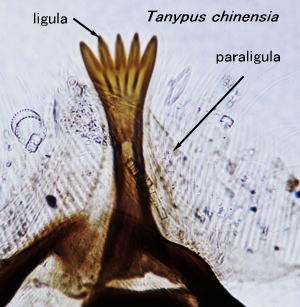 |
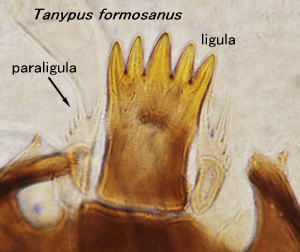 |
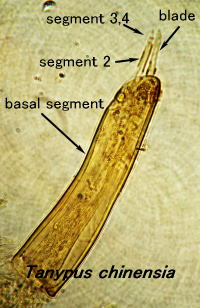 |
| �@Ligula with 5 teeth, Paraligula 30 or more long dentations of comb.(T. chinensis , T.punctipennis) |
Paraligula : outer margin with row of 6 �`8 elongate points.or bifid.(T.formosanus. T kraatzi) |
�@ Antenna 4 segments. Basal segment big.
Antennal ratio 5.3�`5.8 |
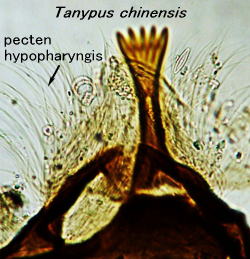 |
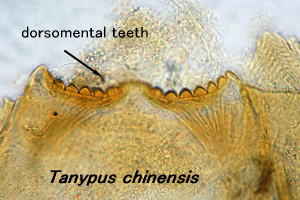 |
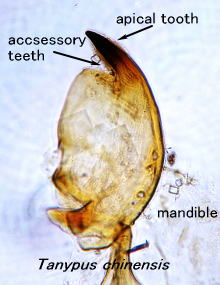 |
| Pecten hypopharyngis see like a thread. |
�@dorsometal teeth 7 pairs. Number and form varies among species.
�@M appendage hard to observe . |
�@Mandible ovoid, apical tooth small, 2 inner teeth very small. |
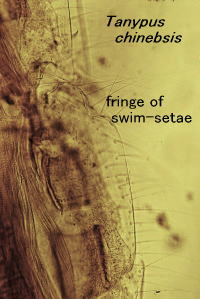 |
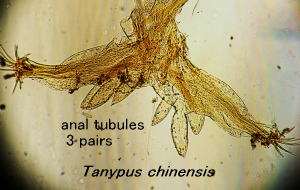 |
�@ |
| fringe of swim-setae |
Anal tubules 3 pairs |
|
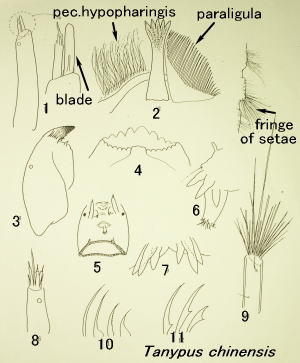 |
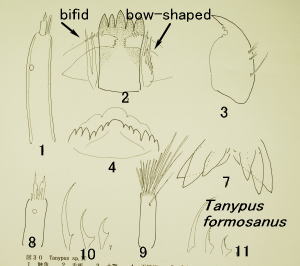 |
The biggest differences of two types belong to Tanypus are formes of teeth of ligula , paraligura and pectenhypopharyngis.
In T. punctipennis type, dorsomental teeth arrenged in concave slightly : in
contrast in T.kraatz type, arrenged in convex.��
�EMandible ovoid, part of apical tooth short.
Both basal tooth and inner teeth small.
�EHeight of procercus 3�`4�@times of diameter
�EAnal setae 10�`20.
�EAnal tubules 3 pairs .
|
return to top of this page
Procladius
Body length 5�`7mm. Fringe of swim-seta on both side on body segments. They inhabit on the sand-pebble bottom of wetlands. They distributed over the country.
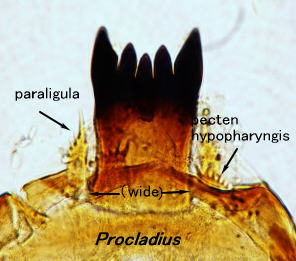 |
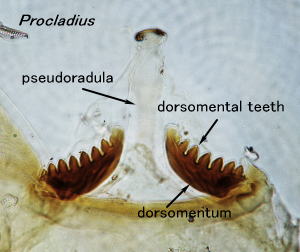 |
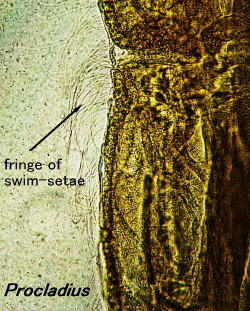 |
| �@ Row of 5 teeth weakly concave.Paraligula few or no points on inner side,
out side with several points . |
�@Dorsomental teeth 6�`9.
�@M appendage ; row of granulation irregula. |
�@�@�@fringe of swim-setae |
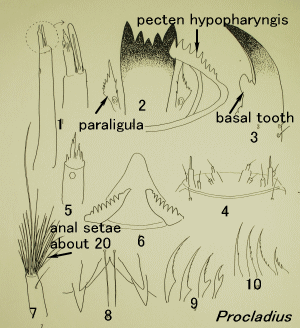 |
�P�FAntanna ; 4 segments , basal segment big, antennal
ratio 4.5�`5.5
�Q�FLigula; 5 teeth arrenged deeply concave. Paraligula with several teeth
on outside, �Q�`�R teeth on inside.
Pecten hypopharyngis with 10 or more teeth.
�R�FMandible ; basal tooth large, inner teeth small, mandible slightly
curve at the tip.
�S�Flabrum
�T�Fmaxilla
�U�FDorsomentum
�V�FProcercus: with 20 or more setae, height 2�`4 times of diameter.
�W�FAnal tubules short 2 pairs�B
�X�FClaws of posterior parapod
�P�O�FClaws of anterior parapod
�@�@ |
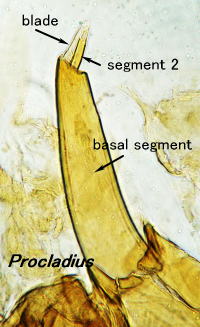 |
return to top of this page
Djalmabatista
Small size ,body length about �Rmm. body light brown, semitransparent with a spotted design. Fringe of swim-aetae on boyh body sides.
It caught in small river flowing into Nakura dam in Isigaki
Isand.
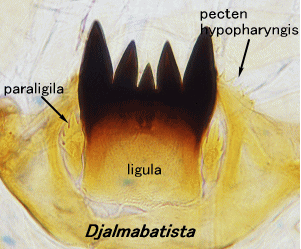 |
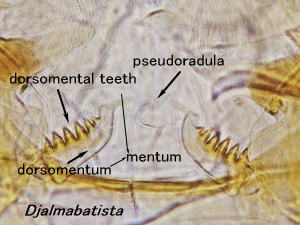 |
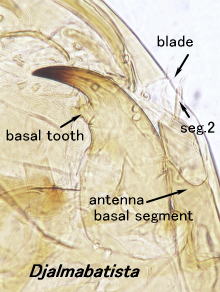 |
Row of 5 teeth weakly concave , center tooth particularily small. Paraligula 1 or 2 points on inner side, out side with 3 points .
Pecten hypopharyngis with 10 teeth.
(There is the kind having 4 teeth, too) |
Dorsomental tteeth large 6 and small 1 . M appendage triangle
, row of granulation irregular. |
Apex of mandible blackish brown, moderately curved. Basal tooth and 1 inner
tooth large.
Antenna 4 segments, antennal ratio 3.5.
Antannal length 1/3 times of head .Blade beyond apex of antenna , 2 times
of 2nd�`4th segments. |
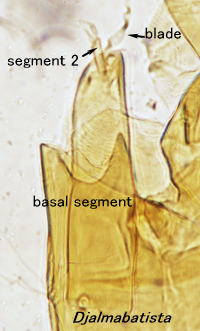 |
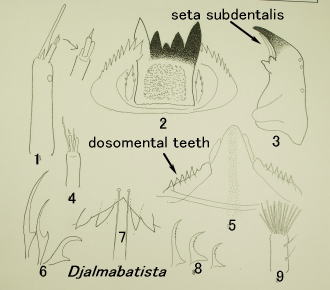 |
�P�FAntenna
�Q�FLigula : 5 teeth or 4 teeth The width and length of basal
part about the same .
�R�FMandible
�S�Fb-seta of maxilla palp with 2 segments
�T�FDorsomentum
�U�FClaws of posterior parapod.
�W�FClaws of anterior parapod.
�X�FProcercus; with 14 anal setae , height 3 times of diameter. |
|
return to top of this page
Psectrotanypus
Body length �X�`�P�Omm. Living body light orange. cephalic index 0.85�`0.90
. This larva caught in Lake Biwa, few population. They inhabit
eutrophicated river , too.
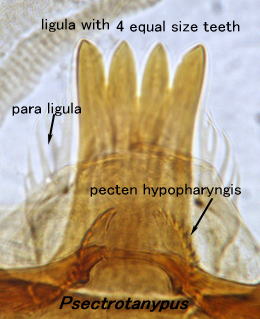 |
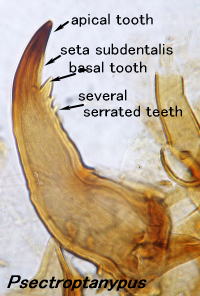 |
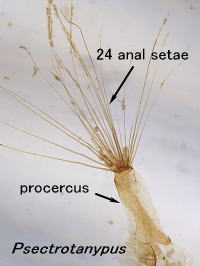 |
�@�@With 4 teeth, equal in size, tooth row straight. Width of
ligula almost equal from upper to lower. Paraligula more
or less divided into 8 branches.
�@�@ |
�@Slender, strikingly curved inwards. Basal tooth large, with broad , apically directed tip. Several small ,saw-like teeth present on inner margin of mandible, proximal to basal tooth. |
�@Anal setae 24. long seta , 2.5 times of procercus. height
3 times of diameter.
�@ |
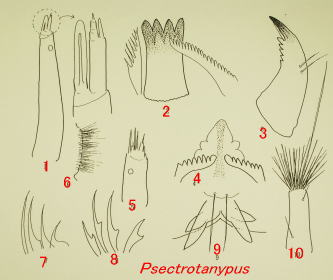 |
�P�FAntenna : 5 segments, antenal ratio 6.5. 3rd�`�T���� segments short.
�Q�FLigula, Pecten hypopharyngis with 22�` 23teeth.
�R�FMandible: several serrated teeth below basal tooth.
�S�FDorsomental teth 7 pairs, row of granulation weakly.
�T�FMaxilla palp
�U�FFringe of swim-seta
�V�FClaws of anterior parapod
�W�FClaws of posterior parapod
�X�FAnal tubules
�P�O�FHeight of procercus 3 times of diameter . anal
setae 24. |
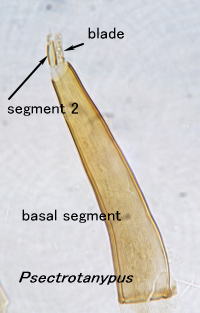 �@ �@ |
return to top of this page
Fittkauimyia
Body length �Tmm. Body colore light brown , Fringe of swim-seate on both
side of each segment. Eye spot 1 pair .
I caught only one larva at rabit flow in River Biteki(Lake Shikotu, Hokkaido)
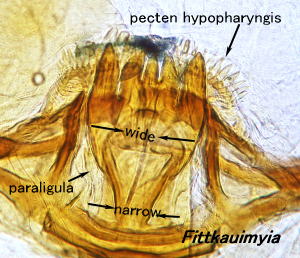 |
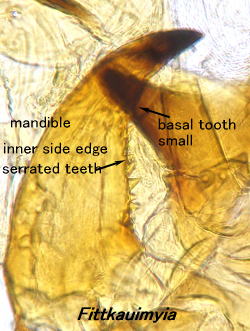 |
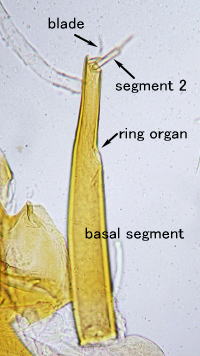 |
Ligula with 5 teeth, inner teeth curved slightly inwards, yellowish brown. Basal
part of ligula narrow. Paraligula divided into 3. Pecten hypopharyngis
with 20 or more teeth, 6�`7 teeth from apical arranged 1 row, afterward
2 rows .
�@�@�@�@�@�@�@�@�@�@�@�@�@�@�@�@�@�@�@�@�@�@ |
�@Mandible curved slightly. Basal tooth small, Proximal of apical tooth
, on inner side in mddle part of mandible, ,a large number of strong serrated
teeth. |
�@Antenna with 4 segments. Antennal ratio 4.5�`4.7. Ring organ 2/3 of basal segment. |
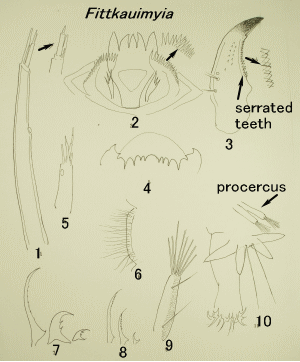 |
�P�FAntenna :Antennal ratio 4.5�` 4.7
�Q�FLigula
�R�FMandible
�S�FDorsomentum ; M-appendage hemicycle, row �@ of granulation
not fine.
�@�@Mentum subdivided into median section and lateral
section .
�@�@Median section; midle tooth and 3 lateral teeth on
each side.
Lateral section ; A large tooth on inner side and
a large , apically produced and inwardly curved
,pointed tooth laterally.
�T�FMaxilla: b-seta 2 segments
�U�FFringe of swim-setae.
�V�FClaws of posterior parapod
�W�FClaws of anterior parapod
�X�FProcercus: height 3.5 times more than diameter.
Inside of procercues brown. Anal setae 8.
�P�O�FAnal tubules |
�@ |
return to top of this page
Apsectrotanypus
Body length �U�`�Vmm. Living body color light orange. Both sides of body segment with fringe of swim-setae. Eye spot 1 pair , small.
They inhabit among the deposited leaves in river, destributed over the
country.
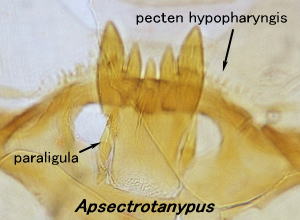 |
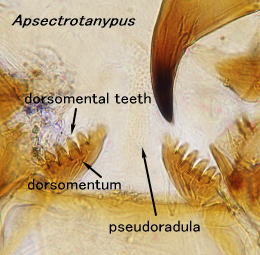 |
 |
| With 5 teeth, tooth row deeply concave. Outer tooth 2 times as long as
middle tooth. Paraligula bifid,. Pecten hypopharyngis with 10
or more teeth. |
Dorsomental teeth with 5. Row of granulation not fine. |
|
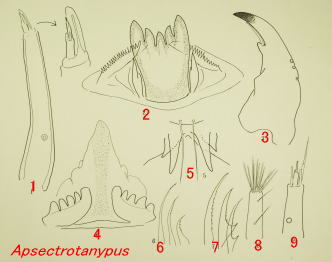 |
�P�FAntenna : 5 segments. antennal ratio�@6�`7.5. . Blade
: beyond apex of antenna.
�Q�FLigula
�R�FMandible : moderately curved , gradually narrowed towards
apex. Basal tooth small but fine, inner teeth absent.
�S�FDorsomentum
�T�FAnal tubules conical, 2pairs
�U�FClaws of anterior parapod
�V�FClaws of posterior parapod
�W�FProcercus ; height 3�`4 times of diameter. anal setae
10�`14
�X�FMaxilla : ring organ about middle of basal segment.
|
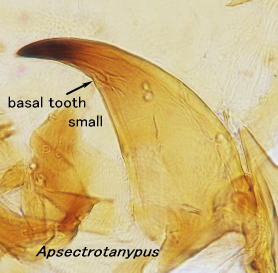 |
return to top of this page
Macropelopia
Large larva , about �X�`�P�Omm�@, Body redish orange , head redish brown. Eye
spot 1 pair. With fringe of swim-satae. Antenna 4 segments, 1/3�`1/4
times of head length. Antannal ratio 7�`9. Height of procercus 3�`4 times
of diameter, with 13�`15 anal setae. Anal tubules 2 pairs, conical.
the larvae inhabit among fallen leaves in still water.
�B
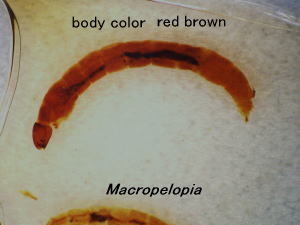 |
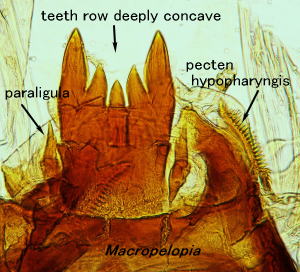 |
|
| Living body redish orange i..Head redish brown. |
Ligula : 5 teeth arranged concave. deeply , outer 2 teeth particularly
large.
Inner teeth curved outwards slightly.
Paraligula with 1 or 2 small teeth on inside.
Pecten hypopharyngis with 20 or more small teeth in a row. |
|
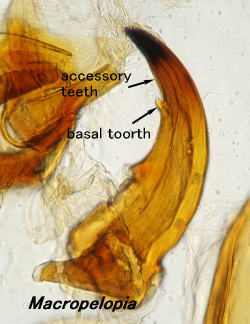 |
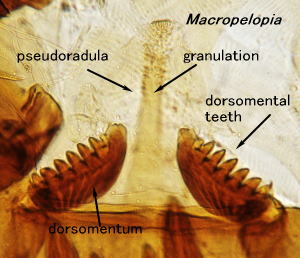 |
|
Mandible : Slender, moderately curved . Basal tooth not large but clear,
1 inner tooth small..
|
Dorsometum with 5�`8 teeth .M appendage triangle , row of granulation irregular. |
|
return to top of this page.
Brundiniella �@�@�@�@�@�@
Body length 4.5�`�Tmm . Living body light yellowish green in color. 7�`8�@pairs
fringe of swim-setae on each abdominal segments. Eye spot 1 pair.
b-seta of maxilla palp with 2 segments.
This larva caught in Takahashi river.
(Details unclear in this larva.)
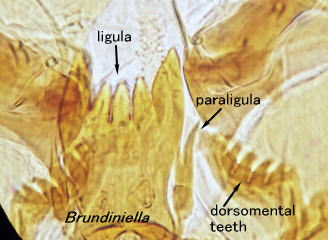 |
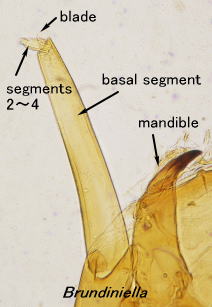 |
Ligula : outside 2 teeth large, other 3 teeth about equal in size, inner
teeth not curved outwards. Paraligula bifid.
Pecten hypopharyngis with 10 or more teeth .
Dorsomental teeth 6, M appendage long triangle, row of granulation rough,
irregular. |
Antenna 4 segments. length 1.6 as long as mandible, antenal ratio 5.5�`6.0.
Blade not beyond the apex of antenna.
Mandible :basal tooth small but clear, inner teeth absent., moderately
curved towards apex.
|
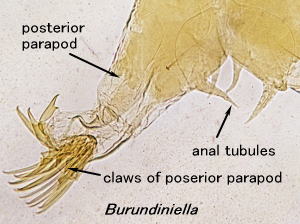 |
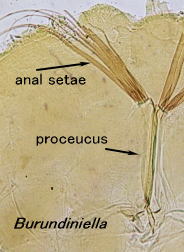 |
| Anal tubyles both 2 pair short, sharp conical. |
Height of procercus 6 as long as diemeter . Anal setae 10, length 2�`�R�@times
of its height. |
return to top of this page
Tanypodinae�@group �ꗗ
























 �@
�@
















